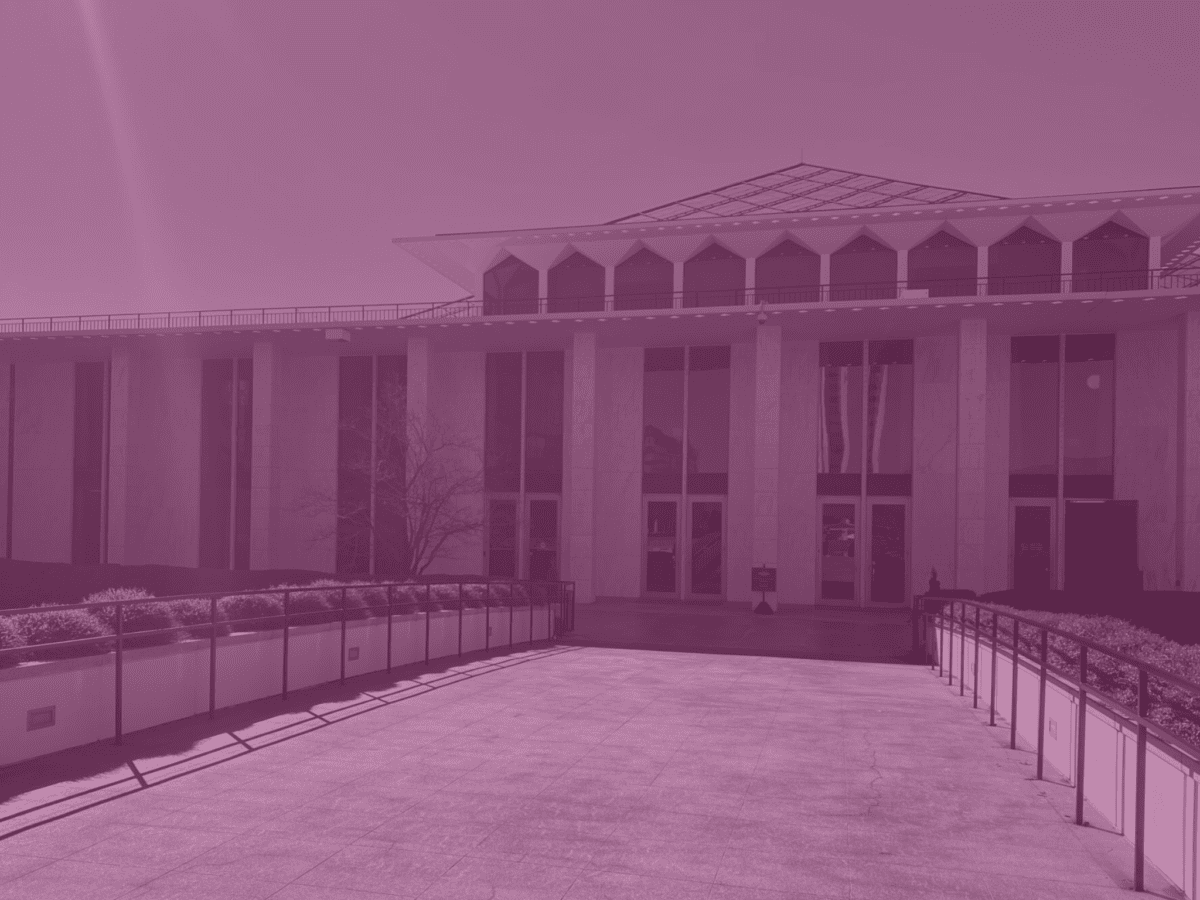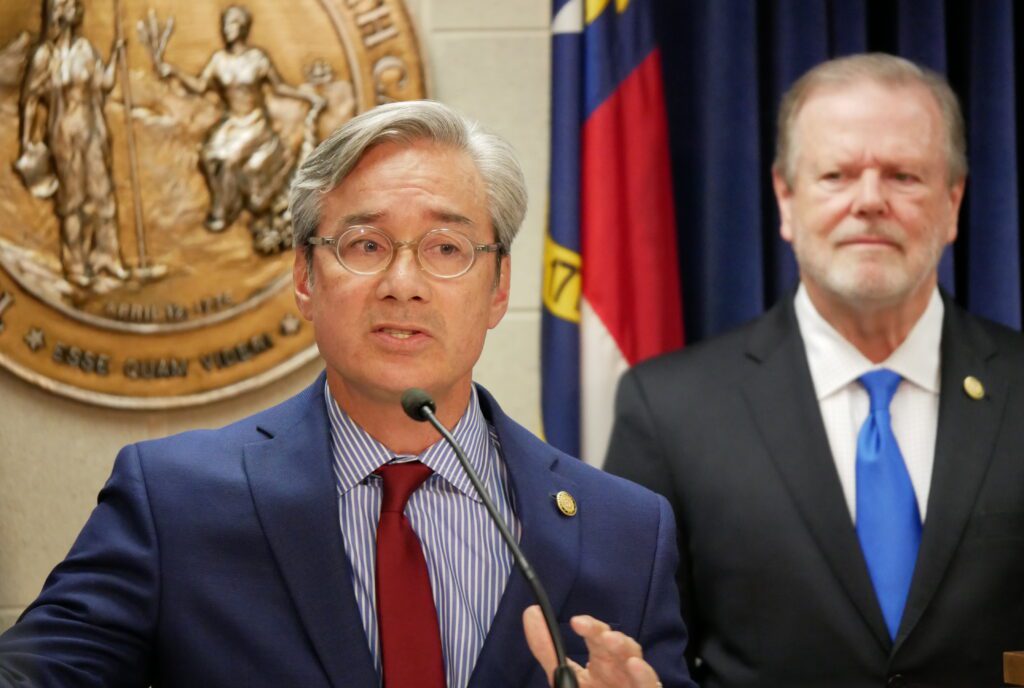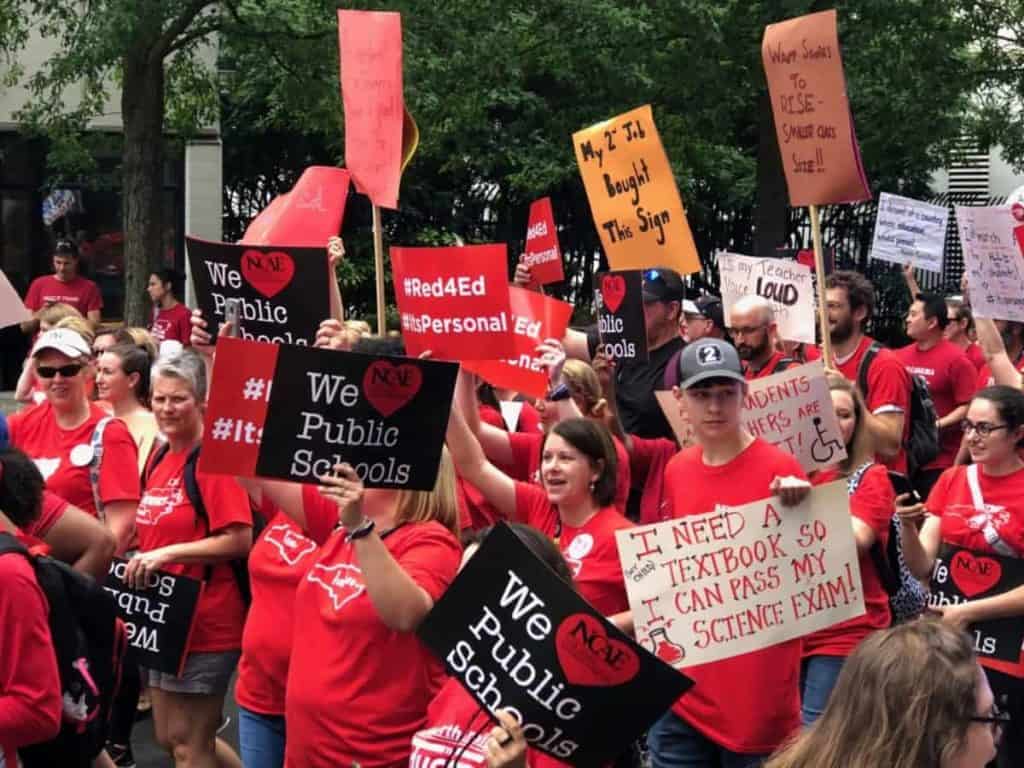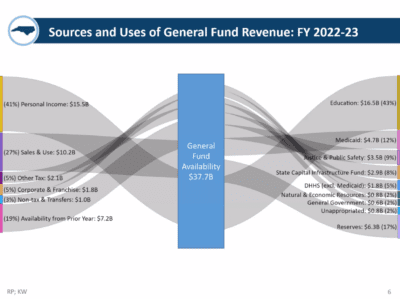
Share this story
- As teachers and students start returning to school, there is still a state of emergency for public education in North Carolina. Here’s a quick look at where multiple issues impacting education stand – including the budget, Leandro, and more. #nced
- As of July 19, 40 school districts had expressed concern about the impact of the proposed voucher expansion. Those districts include urban and rural districts in counties that lean Republican and Democratic.
|
|
As teachers and students start returning to school, the state of emergency for public education in North Carolina remains in effect.
On May 22, Democratic Gov. Roy Cooper declared the state of emergency in response to legislation proposed by state Republicans, including the vast expansion of private school vouchers. President Pro Tem Sen. Phil Berger, R-Rockingham, is calling it the “largest expansion of school choice” since the state started the Opportunity Scholarship program 10 years ago.
“The events in Raleigh this year have made it clear that there’s now no middle ground in public education in North Carolina – either you’re for our students or you’re not,” State Board of Education Chair Eric Davis said at the board’s August meeting. “And if you’re for our students, we must be all in for all of our students, and their teachers, and their principals, and their schools.”
Until this week, it’s been quiet at the General Assembly this summer, but serious policy proposals are under consideration.
The legislature reconvened this week to override vetoes, with more activity anticipated in the coming weeks. Here’s a quick look at where multiple issues that will impact education stand.
Why is there a state of emergency?
The Republican-led Senate released its budget proposal in May, prioritizing school choice expansion.
The budget would add more in recurring funding to expand private school vouchers through the Opportunity Scholarship Grant Program over the biennium than it would add to implementing its proposed teacher salary schedule, by about $27 million.
With the additional allocations, the Senate’s revised net appropriation for the Opportunity Scholarship Grant Reserve is $636 million over the next two years. The budget also proposes an additional $11 million to fund additional vouchers in 2023-24 and removes all income eligibility requirements for recipients, starting with the 2024-25 school year.
Cooper declared the state of emergency a few days after that proposal was released, calling on North Carolinians to inform themselves about the proposals and contact their legislators.
“It’s time to declare a state of emergency for public education in North Carolina,” Cooper said. “… It’s clear that the Republican legislature is aiming to choke the life out of public education.”
A May fiscal note from the Office of State Budget and Management (OSBM) said the budget’s proposal would decrease total state funding for public schools by $203.8 million if 50% of new voucher recipients previously attended public school. The note included 5-8% decreases in state funding in some rural counties.
The N.C. Department of Public Instruction (DPI) previously said they don’t expect to see a significant impact in the immediate future, based on what has happened in other states and the capacity of private schools to enroll additional students.
State Superintendent Catherine Truitt said it is most likely that the expanded vouchers would be used by families already in private schools.
“What we’re saying is that there are not enough places in private schools for new families to leave their public schools and avail themselves of private schools,” she said.
There is no way to predict if private schools will build capacity in order to accept more students.
Here is the most recent annual report on private schools in North Carolina, which was released this summer. You can see the statewide distribution of the schools on page four.
Many are even more worried about the use of vouchers for homeschools. Here is the most recent annual report on homeschools, which was also released this summer. You can see the number of homeschools by county on page two.
Regardless, in other states where significant policy changes are being implemented that could impact average daily membership (ADM), stabilization funds have been proposed for districts.
Sen. Berger is on the record saying, “It makes no sense to me to provide money to the traditional public schools for children they’re no longer educating.”
It is also important to note that these proposals would take place at the same time that COVID-19 relief funds for schools run out. As EdNC has previously reported, North Carolina is among 15 states that will be at “a particular disadvantage” when federal funding for COVID-19 relief expires in 2024.
In the months following the proposal, a bipartisan group of education stakeholders have raised concerns over the proposed voucher expansion. Primary concerns include the lack of testing accountability at private schools, the impact of the expansion on funding and enrollment at public schools, and that private schools don’t have to serve students with disabilities or LGBTQ+ students.
N.C. Democratic Party Chair Anderson Clayton said in a Zoom call on Tuesday that the proposal could also negatively impact rural counties.
“I’m telling all my rural counties is, you know, your tax dollars are not going to end up in your own backyard anymore,” she said. “Because there aren’t private schools in rural communities. They’re in Mecklenburg County and Orange County and Wake County… And so I’m telling folks, your rural tax dollars don’t deserve to go to those other places.”
As of July 19, 40 school districts had expressed concern about the impact of the proposed legislation. Those districts include urban and rural districts in counties that lean Republican and Democratic.
State Board of Education Chair Eric Davis previously published a letter raising concerns about some Republican legislative proposals, including the proposed voucher expansion.
The state has $15.2 billion in cash on hand with close to $6 billion of that unreserved, EdNC previously reported.
What is happening with the budget?
The House released its budget proposal at the end of March, including a 7.50% across-the-board pay raises for teachers over the biennium, with an average pay raise of 10.2% for teachers slated to get step increases.
The Senate passed its proposal on May 18, including much smaller teacher pay increases along with the drastic expansion of school choice through private school vouchers.
School employees will not see the proposed raises until a final budget is passed. Republican lawmakers have said those raises will be applied retroactively starting July 1, 2023, once there is a budget.
In the meantime, House Speaker Tim Moore, R-Cleveland, and Berger have been hashing out budget differences between the two chambers.
The budget process slowed after the July Fourth holiday, as Moore found himself in the news. In the weeks that followed, Moore also said he does not plan to run for speaker again.
At the end of July, conservative legislators went to the 50th annual meeting of the American Legislative Exchange Council (ALEC), where workshops on “Building on the Momentum for Education Freedom” and “The Educational Choice Movement: Red, Blue, or Purple” were on the agenda.
The House and Senate haven’t agreed on a budget plan yet, despite having a Republican supermajority. Legislative leaders have told the media in recent weeks that they have made progress, but to expect a budget after Sept. 1.
On Monday, Berger said it’s more likely that the budget will be adopted the second week of September, the News & Observer reported.
Members of the N.C. Democratic Party met via Zoom on Tuesday to urge Republicans to release a budget.
“We’re here because it’s been two months since the North Carolina General Assembly has said that they would pass a budget and needed to,” Clayton said. “Any small business owner, entrepreneur, or organizational nonprofit leader across North Carolina knows that one of the most foundational pieces that you need in order to make a good organization or business run is a budget. And that is no different than our state legislature right now.”
The budget delay is also delaying Medicaid expansion for 600,000 North Carolinians without health insurance, Clayton said, along with teacher raises. She specifically cited her sister, a 7th-grade science teacher.
“Schools are facing critical shortages, and it’s not a teacher shortage like the Republicans would like to think it is – it’s a wage shortage in North Carolina,” she said. “We sit on a $3 billion budget surplus right now that should allow for us to give teachers and pay teachers what they’re worth. Ninety-four thousand public school teachers haven’t received their well-deserved raises.”
Without a state budget, North Carolina House Democratic lawmakers and school board members have said that schools won’t have all the teachers and bus drivers they need, according to a News & Observer report.
Schools will operate on last year’s funding until a new budget is adopted.

Education bills
Much of the General Assembly’s committee meetings and work on legislation has been on pause while the chambers work on a budget.
Several committees convened on Wednesday, including the full House and Senate Wednesday afternoon.
The legislature overrode several bills vetoed by Cooper in July, including several concerning charter schools (HB 219 and HB 618) and transgender youth (HB 808 and HB 574).
The General Assembly also overrode the governor’s veto on Senate Bill 49, the so-called “Parents’ Bill of Rights,” which seeks to “enumerate the rights of parents to direct the upbringing, education, health care, and mental health of their minor children.”
“While Governor Cooper has tried to stand between parents and their kids, today the NC House will continue to affirm parent’s rights, protect female athletes, and advocate for the health and safety of our children,” Moore said in an email release.
Soon after the veto overrides passed, Cooper released his own statement.
“The legislature finally comes back to pass legislation that discriminates, makes housing less safe, blocks FEMA disaster recovery funding, hurts the freedom to vote and damages our economy,” Cooper said. “Yet they still won’t pass a budget when teachers, school bus drivers and Medicaid Expansion for thousands of working people getting kicked off their health plans every week are desperately needed. These are the wrong priorities, especially when they should be working nights and weekends if necessary to get a budget passed by the end of the month.”
On Thursday, Truitt took to social media to offer support of the veto overrides for HB 574 and SB 49.
More than 100 education-related bills made the crossover deadline, meaning those bills passed at least one chamber in the General Assembly by May 4. You can read EdNC’s previous report on those bills at this link.
Most likely, the General Assembly will wait until a budget is passed to continue more work on legislation. It is also likely that legislation that didn’t make crossover – such as school meals or voucher expansion – will be included in the compromise budget proposal.
EdNC will continue to track all education-related legislation moving forward.
In the meantime, view the full list of bills that made crossover at this link.

The Leandro case
The Leandro case began nearly 30 years ago when families from five low-wealth counties sued the state.
The state Supreme Court has previously held in the case that North Carolina’s children have a right to the “opportunity to receive a sound basic education” and that the state had not lived up to that constitutional requirement.
Cooper’s budget proposal included full funding for the Leandro Plan, aimed at getting the state in line with its constitutional duties on education. Neither the House nor the Senate plan explicitly mentions funding Leandro.
The General Assembly’s current shortfall for Years 2 and 3 of the Leandro Plan, administered through DPI, is nearly $510 million, per an April 17 court order.
On May 5, Berger and Moore filed an appeal to that order. A spokesperson for the North Carolina Judicial Branch told EdNC there are “no updates that we are aware of” in the case.
Read more about previous rulings in the case at this EdNC report from last March.
PEPSC updates
In March, the State Board of Education voted to ask lawmakers for authorization to run a six-year pilot of its Pathways to Excellence plan to overhaul licensure and teacher pay in North Carolina.
The 2023-24 school year would have been a planning year, followed by five years to pilot, EdNC previously reported.
There will no longer be a pilot of the plan this year, Dempsey told WFAE last month.
Dempsey told WFAE reporter Ann Doss Helms that legislative leaders are clearly focused on the expansion of private school vouchers over teacher licensure reform.
“If we had known then what we know now, we may have understood either No. 1, we might have needed to navigate it differently, or that given the amount of oxygen that some of the other legislation was going to take up, there wasn’t going to be a lot of room for the Pathways proposal,” Dempsey told WFAE. “And if you look at the cost of just the voucher plan alone ($1.7 billion over the next five years), that takes a lot of money that could have gone into piloting and implementation of the Pathways model.”
Under North Carolina’s current system, teachers are paid based on their years of experience. The new proposal would introduce different levels of licensure and corresponding pay, ranging from apprentice teachers to advanced leadership roles.
All of the proposed teacher pay raises from the General Assembly follow the current pay system. It is unclear when the Pathways to Excellence Plan will now be piloted.
Last week, PEPSC met for its monthly meeting and approved its annual report to the General Assembly for 2022-23. The report will now go to the State Board of Education in September; it is due to lawmakers on Dec. 1.
The report includes information on the commission’s membership and structure, a policy guide, and meeting summaries.
What about the election?
Most municipalities in North Carolina conduct elections in odd-numbered years, including 2023. These elections include local government races, such as mayor and councilperson. Some municipalities may also conduct referendums, on property tax, bonds, or other issues.
View the municipal election dates on the N.C. State Board of Elections’ website.
The 2024 Primary Election, held on March 4, 2024, includes statewide races, along with some local school board elections. Many other school board races take place during the general election in November.
The candidate filing period for the 2024 primary elections begins at noon on Monday, Dec. 4, and ends at noon on Friday, Dec. 15.
EdNC will have more updates on candidates, voting timelines, and education-related issues in the months to come.
Behind the Story
This article includes reporting from EdNC reporter Liz Bell, and from previous EdNC articles about this year’s budget and long session.
Recommended reading




